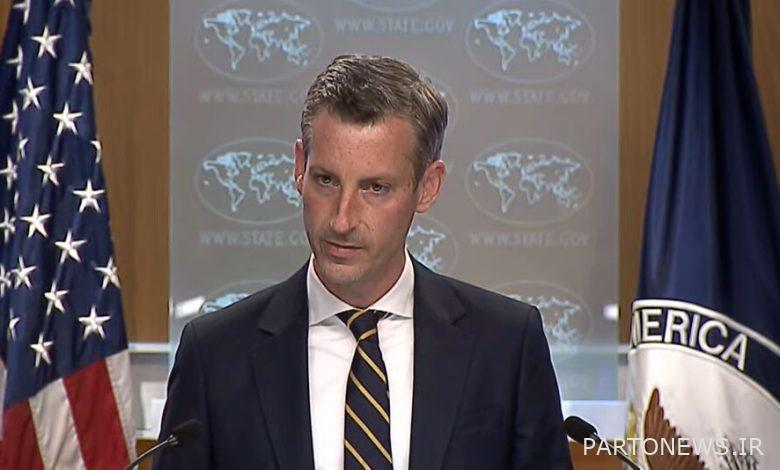America: Diplomacy is the most effective method for Iran

Ned Price, the spokesperson of the US Department of State, claimed in a gathering of reporters on Tuesday evening local time that US President Joe Biden has committed to Iran not getting a nuclear weapon, and we still believe that diplomacy is the most effective, durable and stable way to It can limit Iran’s nuclear program.
He claimed: The agreement on the table puts us in a better position in relation to Iran’s nuclear program.
Using the tactic of fake deadlines again, this American official claimed: time is being lost and the message that Iran is sending to us and the world is that it is not interested in returning to mutual adherence to the JCPOA.
Without referring to the lack of political decision-making by the Biden administration in negotiations to lift the sanctions, he claimed: The current situation is unacceptable in our opinion. We have been consulting with our allies for a long time about an alternative to the JCPOA.
He also claimed that if Iran clearly shows that it does not intend to adhere to the JCPOA, the agreement that is on the table will become meaningless with nuclear developments and we will pursue another path.
Earlier, Robert Mali, the US special representative for Iran affairs, claimed that Washington is ready to return to the JCPOA and that this agreement can reduce tensions in the region.
On Tuesday, local time, in an interview with the CNN news channel, Robert Malley, the US special representative for Iran affairs, claimed: We are ready to return to the JCPOA. This agreement can reduce tensions in the region and pave the way for a wider reduction of tension.
Like other American officials, he threw the negotiation ball in Iran’s court and said that Tehran must finally decide whether it wants to return to the JCPOA or not.
At the same time, without mentioning the violation of the agreement and the lack of decisive political decision of the Biden administration, the US special representative for Iran claimed that the possibility of revitalizing the 2015 nuclear agreement is decreasing day by day.
At the same time as the presence of Russian President Vladimir Putin in Iran, he threatened Tehran with punishment and sanctions if it provided drones to Moscow.
Mali threatened about the serious claims of America against Tehran regarding the sending of drones to Russia: We have tools at our disposal and by means of them we will sanction any transfer of such drones to Russia.
The Qatar talks were held on the 7th and 8th of July, after a three and a half month hiatus following the Vienna talks, between Iran and the United States indirectly and with the facilitation of the European Union.
Continuing their blame game, the American officials insist on showing Iran as the cause of the delay in reaching the final agreement and the possible failure of the negotiations, while Tehran has set its demands based on the 2014 agreement and the experience of the western side’s violation of the covenant.
In an article in the Washington Post before his trip to the region, the President of the United States, Joe Biden, criticized his predecessor Donald Trump and wrote clearly: “Regarding Iran, we are with our allies and partners in Europe and around the world. “We united to remove our isolation. Now it is Iran that is isolated until it returns to the nuclear deal.”
He pointed to the anti-Iranian action of issuing a resolution in the Board of Governors of the International Atomic Energy Agency in June of this year (2022) and acknowledged: My government will continue to increase diplomatic and economic pressure until Iran is ready to return to complying with the agreement. 2015 nuclear deal (JCPOA); As I am still prepared to do so.
In response to the article of the President of the United States in the Washington Post newspaper, Iran says: Mr. Joe Biden’s emphasis on the pursuit of the policy of economic and diplomatic pressure against Iran contradicts the continued desire of the United States to revive the 2015 agreement and in the path of the Trump administration’s failed policy of maximum pressure. It is against the Islamic Republic of Iran.
Iran’s Foreign Minister Amir Abdollahian had a recent phone call with Josep Borrell, EU foreign policy official, regarding the latest status of negotiations to lift sanctions, as well as some important regional and international issues of common concern.
In this telephone conversation, the Minister of Foreign Affairs of our country stated: There is no doubt in the will of the government of the Islamic Republic of Iran to reach a good, strong and stable agreement.
Expressing his appreciation for the continuous efforts of Josep Burrell and Enrique Mora and referring to his recent talks with the foreign ministers of Italy and France, Amir Abdollahian stressed: The White House should put aside exaggerations and doubts and be realistic on the way to achieving a solution. and take steps to reach an agreement and stop repeating the ineffective approach of the past and unproductive behavior and resorting to pressure and sanctions.

